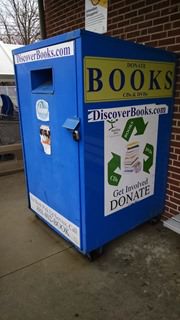 For as long as I’ve been living here in Indianapolis, I’ve noticed this donation box standing at the Kroger grocery store a few blocks away from me. I finally got around to snapping a picture and coming back home and looking “Discover Books” up. It turns out that, for all the sign on its façade mentions “books for charity” (though that may be a sticker someone pasted on after the fact, I’m not sure), it’s a face of one of those for-profit book-reselling outfits I mentioned in November.
For as long as I’ve been living here in Indianapolis, I’ve noticed this donation box standing at the Kroger grocery store a few blocks away from me. I finally got around to snapping a picture and coming back home and looking “Discover Books” up. It turns out that, for all the sign on its façade mentions “books for charity” (though that may be a sticker someone pasted on after the fact, I’m not sure), it’s a face of one of those for-profit book-reselling outfits I mentioned in November.
As Discover Books explains on its web site, it gets books from thrift stores, library discards, curbside pickup, and its collection boxes, puts them through its automated sorting facilities, and then resells them online “to be enjoyed again”, redistributes them “to support literacy efforts,” or recycles them if they’re no longer of any other use.
The web site is mum on the exact percentages of books it takes in that go to each end, though it notes it has donated over 8.9 million books to North American and international non-profits. It has also recycled over 500 million pounds of paper, keeping it out of landfills. There is a request form where charitable organizations can request books.
I was ready to be indignant about this outfit taking books people donate and selling them to make a profit, but after I thought about it for a while, it occurred to me that Discover Books actually is performing a service that has value, and in that light deserves to make a profit from it. After all, paper books aren’t like e-books; they don’t just magically appear where they’re wanted. Someone has to go to the trouble of getting them there.
And how would the paper books get to where they’re wanted without Discover Books? It would depend on someone wanting to go to the trouble to list them on Amazon or eBay, and package them up and ship them when someone bought them. While some people have managed to make a living that way, it’s not the sort of thing that the average person would want to put in the time or effort to do. And even selling one’s own unwanted books on Amazon or eBay would be a lengthy, time-consuming process—you have to list them, and wait to see if anybody wanted them, and then pack them up and trot them down to the post office.
A lot of entrepreneurs and companies make money by taking on effort that ordinary people don’t feel like doing—whether that’s fixing your car, wiring your house, driving you across town, cooking a meal, etc. Some people prefer to do those things themselves and think people who’d pay someone else to do them are fools, but other people feel their time is more valuable than what these paid services get out of it.
Taking books that could be useful to someone and sending where they will be useful is just another of those kinds of things. If they’re willing to pass some books along to charitable organizations and keep a lot of fully-recyclable waste paper out of the landfills, even better. Nobody’s forcing people to donate their unwanted books to Discover Books. If people have something better to do with them instead, I’m sure they will. But for people who don’t want to be bothered, well, why not? It beats having the books sit around and not do anybody any good.
Perhaps the best thing to take away from this is that there are enough people out there who still read that a company can make money this way—even in the era of e-books and other tablet distractions.


































I can’t recall buying from Discover Books, but I do buy a lot of second-hand books from various charities. They serve a great purpose. The real crime is that I’ve been told that Amazon takes $1.35 of the sale price of each sale for doing essentially nothing. For a book that sells for $5, that’s a lot of money out of the pocket of a worthy charity. Here’s one you can buy directly from online:
http://www.betterworldbooks.com
These online stores are an excellent way to get books, especially rare and old ones that have long been out of print. Recently, I ordered a copy of C. S. Forester’s WWII novel, The Ship. It’s not from the first printing, but it was the “fourth impression” of that edition and printed in August of 1944 to “War Economy Standard.” It’s a morale-boosting book about the war published during the war and in excellent condition. I’ve acquired a bit of history for only a few dollars from a bookstore that says it is “the most easterly bookshop in the UK.”
That in itself is interesting and something no ebook can match. Books like those also make great gifts.
–Mike Perry
I’ve been tracking these shysters for years. Please don’t fall for their PR charms. Sadly, Discover Books has a long history of defrauding the public, and has been forced by Attorneys General into being honest. The dirt:
‘Discover Books’ ― formerly ‘Thrift Recycling Management’ (TRM) ― is a for-profit business — not a charity, as some may have assumed. As TRM, the company once boasted of being “thе lаrgеѕt seller οf used books οn thе Internet,” with 2010 revenue of $27 million, according to the Seattle Times.
c. 2009-2012, the company was sharply criticized for selling about half of the usable books collected in its blue bins, while not making it clear that these “donations” were helping fund the company. Misleading language on earlier versions of TRM’s bins, such as the phrase “Books for Charity,” led some to believe that all of the books would be donated to schools and libraries, which would suggest that the company was a nonprofit.
Media reports on TRM and its alleged “charity front” ― Reading Tree ― had also expressed concern over the unusually close relationship between the two entities, as well as the negative impact TRM’s collection activities has had on local book charities such as the Friends of the Library associations across the country.
A slew of complaints from such groups and an investigation by Oregon’s Dept. of Justice likely prompted the company to start obscuring the “for Charity” text on its bins starting around 2011. The negative attention may have also caused TRM to rebrand as Discover Books, and Reading Tree to cease operations, in mid-2012.
Discover Books has claimed that for every book it sells, one book is donated. Seems equitable, until one analyzes the typical *dollar value* of the cherry-picked titles the company likely retails — bestsellers in good condition — and the dollar value of what they donate: mostly old children’s books. Business stats provided in media stories on Discover Books suggest that over 90% of the dollar value of the usable books dropped into the company’s bins went to the for-profit side, while less than 10% went to charity.
Yes, Chris, nobody’s forcing people to donate to Discover Books. But the company has done something far worse: they got rich by routinely misrepresenting themselves as a charity, pathologically lying to thousands of unsuspecting donors who saw ‘Books for Charity’ on the bins and believed it, until Oregon regulators made them stop … at least in Oregon.
Please boycott Discover Books. Consider donating instead to your local Friends of the Library group. Research before donating. Thanks for the chance to express my opinions.
Reports on Discover Books (as TRM) and the now defunct Reading Tree:
Battle Over The Blue Book Bin | wusa9com
Not all “Books for Charity” go to charity – Marketplace
Book donation boxes being called deceptive by opponents – KNAU
Books for charity’ bins around Oregon reveal blurry …
From my experience, selling books to a used book store is about like giving them away. Several years ago I took a carton of used books, which weighed an estimated 30 pounds, to a used book store.The books were in good condition. I got $5.00 for the lot- which was what I predicted. As I have nearly a bookcase full of hardbound books I purchased from the same store for $1 apiece, I am unable to object to getting $5 for the lot.
I have no objection to Discover Books making some money off donated books. Had they purchased those books, they would have paid peanuts for them. That’s the way used book stores stay in business.